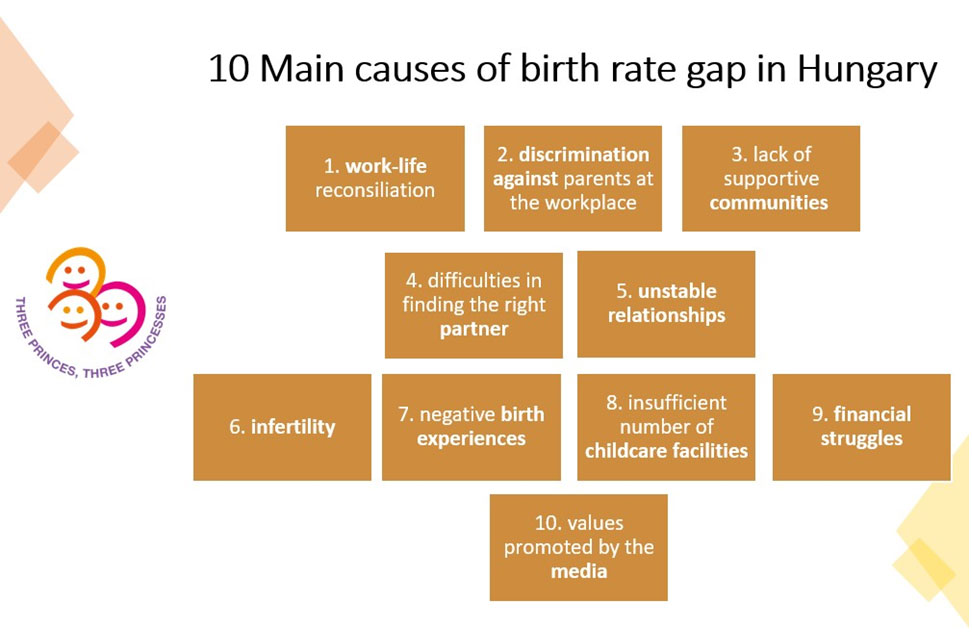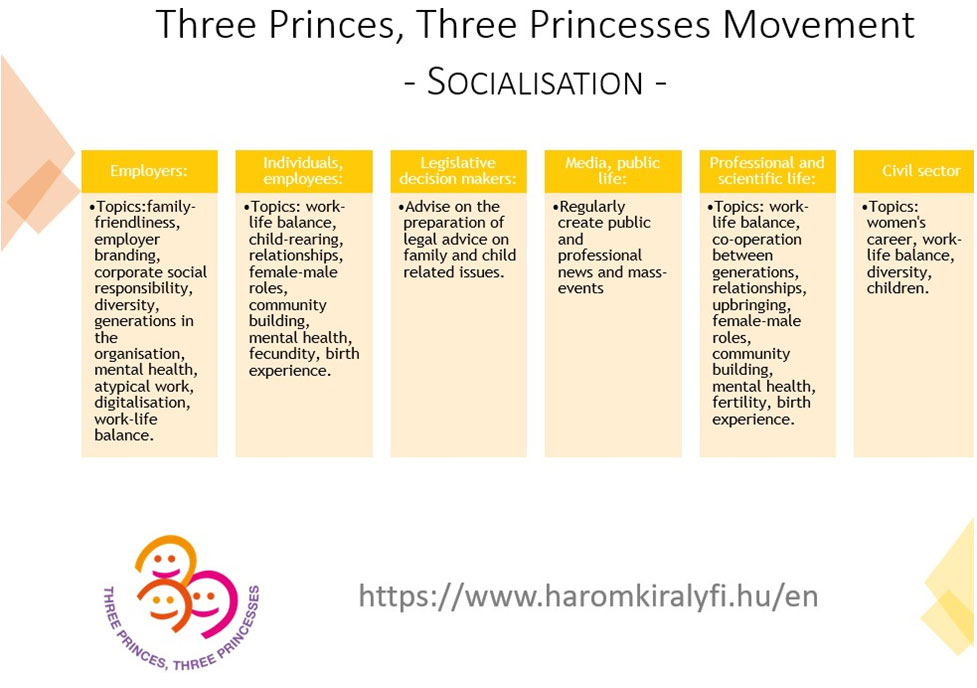The rights and well-being of children and families can be effectively supported through changes in attitude.
The Three Princes, Three Princesses Foundation is a widely renown family organisation in Hungary, which was established by professor Maria Kopp in 2009. The name is a reference to fairy tales, where the heroes of the stories are often third-born princes or princesses.
The aim of the Foundation is to support young adults in accomplishing their dreams of having children. The organisation pays special attention to changing attitudes, community building, professional and scientific activities, and supporting decision makers.
As an organisation focusing on attitude change, to achieve its goal the following questions must be answered:
I. What kind of help and support do young adults and young families need to be brave enough to have children?
II. How can a civil organization help?
I. What kind of help and support do young adults and young families need to be brave enough to have children?
In Hungary, young adults want more children as they give birth. The results of different research polls show that young adults on average wish to have approximately 2,3-2,5 children. However, the reality is approximately 1,3-1,5 children. It can therefore be said that 1 child is missing from each young family’s dreams in Hungary.
In order to undertake effective measures to solve this issue, the first step is to analyse the origin of the birth rate gap.
Our founder professor, dr. Maria Kopp, established 10 main causes of birth rate gap in Hungary through her scientific research.

The first three causes are linked to the labor market and social environment. („Lack of supportive communities” means not only workplace communities but communities in a broader sense.) Two causes are partner-related difficulties, another four are problems of couples that have children or want children. The last cause is related to the influence of media and it’s messages.
It is visible that a diverse network of relationships is needed to handle all these areas.

To be able to keep in hand a wide range of partnerships, it is necessary to work in teams, in cooperative projects or programs.
II. How can a civil organization help? How to act?
1. PATIENCE
We have to take our time, just like the green movement did. It took decades to get to the point where we are now, where waste is collected separately and recycled. Patience and perseverance in spreading the message is vital for long term effects.
2. COOPERATION: (politics, civil society, workplaces, higher education, media)
On the 15th of May we celebrate the international day of the family. On this day our movement traditionally organises conferences in the house of the Hungarian Academy of Science. A few years ago GE – one of our family-friendly mentor organisations – called me to share that they are ready to open their Working Parents Day initiative nationwide for all Hungarian based enterprises. They planned to organise it on the international family day and they asked me to help in sharing the call nationwide. A great initiative which also caused great concern. On one hand there is our tradition, on the other hand there is a good new opportunity. If we invite other companies to join GE’s call, our program can lose many potential participants. It was a great dilemma but only for a few seconds. I knew that we are both committed to cooperate and I was ready to support this initiative.
We found a good solution together: we both (Working Parents Day and conference participants) greeted each other in video messages. This way both programs were enriched and Working Parents Day was part of our portfolio.
3. INTEGRATION
We try to act as an integrative organisation. We find and formulate messages that are acceptable for a wide scope of actual and potential recipients. A good example is our „Declaration for Supporting Families and Birth”. The Three Princes, Three Princesses Movement successfully effected the signing of a statement by five parliamentary parties to support parents and families.
4. POSITIVE COMMUNICATION
In our daily practice, we communicate our goals in an integrative and positive narrative. Instead of problem-focusing, we use a solution-focused approach to a given subject. For example, by focusing on the topic of missing fathers from families, we asked two psychologists to prepare booklets to help young men to find their proper role in fatherhood after becoming a dad. These are our “Dad’s booklets”.
Again our 4 tips for being successful in attitude change: patience, cross-society cooperation, integration, and positive communication.
Balansz Programme – a brand for businesses
There is no space to introduce all our activity but one of our most popular programmes is the Balansz Programme (Balance Programme). Its operation has four bases:
1. COMPETITION:
„The Family-friendly Company of the Year” award and gala is a well-known, highly rated brand in Hungary. We found, that the business sphere likes competition by nature. With that in mind we started our award in 2013. In the first couple of years it was our job to invite companies to join the call, but nowadays we receive inquiries from them throughout the whole year. Diverse sectors, big companies as well as SMEs apply to the competition every year.
The company award has a younger co-award, the „Family-friendly Hospital and Hospital Department”. We started this competition in cooperation with the Hungarian Hospital Association, wanting to reward family friendly medical facilities, taking into consideration the opinion of the employer and service provider. We will celebrate family-friendly hospitals for the third time in 2021.
2. COMMUNITY:
The Balansz Community helps family-friendly employers (HR, communication, CSR, diversity professionals and company leaders) find allies and inspiration. They learn from each other, share the best practices and draw strength to step forward. We organise meetups and professional workshops regularly throughout the year.
3. DATA & INFORMATION:
Data is useful for the analysis of the status quo of various aspects of our lives. Public discourse can be better understood and thematised through data-based communication.
We explore the labour market from the point of view of employees and employers.
Our research data includes part-time job research in 2017, “back to work” – successful reintegration research in 2019, Home & Office – home office research in 2020.
4. CALL to ACTION:
Time after time we initiate or cooperate in actions where many employers can take part and build their employer brand.
-
One is the Working Parents Day started by GE. It works now nationwide and also internationally through participants’ foreign sister companies. It is a day when well-being, parenting, work-life, digitalization, communication and such issues are in the focus all day on the joined workplaces and emlpoyees can enjoy workshops and lectures all day. It is always on a workday.
-
Another good example is our #MUTIHOLDOLGOZOL - (Show me where you work mum and dad) call. The idea owner is a british company, BT – one of our mentor organisations. The essence of this call is: during the spring holiday more children have the chance to see where and how their parents work. It is great for the working community (all stuff), for the children, for the parents and builds company brand in an organic way. A great number of companies but even universities or other workplaces joined the call last year. Among others the children were able to find out the answers to the following questions:
“What is money?”, “What is the role of a buyer?”, “How does a videoconference work?”, “What happens with a product before it lands in the retail space of a store”.

Talking about family-friendly competitions and events, the question arises what is a family- friendly workplace at all?
„Family-friendly workplaces” and where to find them
Simply formulated, a family-friendly workplace is where not only the employees, but the children feel accepted as well.
The main areas of focus for the Family-friendly Company of the Year-award jury are the following:
-
Humanitarian and family-friendly initiatives as part of management strategy;
-
Special attention to employees with small children;
-
Family-friendliness takes shape in an innovative way (organisation observes trends);
-
Company is exemplary in its sector;
-
Work-life balance is part of the organisational culture (atypical or flexible forms of work are present);
-
The leadership interacts with the employees.
It is important to note that there are many organizations with a family-friendly approach but without a family-friendly strategy or system. Company leaders often do not use their family-friendly and human focused efforts in their employer brand. This is where a non-governmental organization can help.
A couple examples of family-friendly best practices:
-
FLEXIBLE-WORK (including production)
-
Mom/Dad REINTEGRATION PROGRAMME after a longer period of inactivity – inactivity from the point of view of the labour market. We know that mothers and fathers are very active with their children.
-
BABY and CHILD-friendly office
-
Company CHILD CARE / NURSERY
-
SUMMER CAMPS at the workplace
-
OPEN DAYS (#MUTIHOLDOLGOZOL)
-
WEEKLY POSTAL SERVICE at the workplace
-
MONTHLY craft FAIR for employees
-
WORK&LIFE workshops and lectures organized by the company
-
HEALTH PROGRAMME including mental health and involving family members
-
EMERGENCY FUND for life-crisis situations – for example IVF program
-
FAMILY DAYS (Working Parents Day)
This is how many family-friendly prizes and awards we gave for companies.

The Three Princes, Three Princesses Foundation is one of the best-known non-governmental organizations in Hungary, dealing with youth’ and couples’ difficulties of having as many children as they dreamed of. To help them, attitude change is needed in many sectors of the society.
In the last 10 years we learned how to effect, how to be visible, how to deal with many actors of social life. This short summary showed our main findings to learn on. Our most helpful tools are: time (perseverance), cooperation, integration and positive communication.



